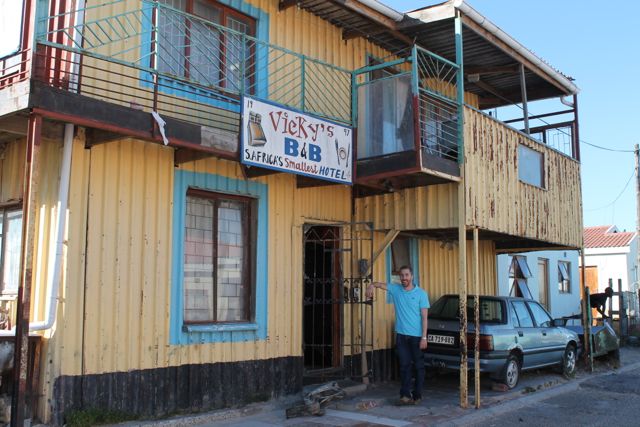My friend Vicky Ntozini was a successful township entrepreneur until she was murdered last year by her husband. After reading online that her children were still running her bed and breakfast in the sprawling township of Khayelitsha, I decided to visit to pay my respects and re-connect. After initially trying to book a tour guide to take me there, I drove there myself–I still knew the way through the winding township streets.
Vicky’s Place started out in a small corrugated iron shack in the squatter camp of Site C, where most families shared an outdoor toilet. After launching in 1999, she was successful enough to attract the interest of foreign tourists and tour groups, and grew her business and her profile. She added a second story to her shack (on top of homemade concrete foundations, concealed behind the corrugated iron exterior) and kept building.
Visitors from abroad, impressed by Vicky, often sent donations through her to the community beyond. Other local entrepreneurs–including the owners of the “Waterfront,” the shebeen (illicit bar) across the street–enjoyed the influx of curious customers. Neighbors grew accustomed to the presence of outsiders, and people felt safe at Vicky’s Place–even though the surrounding area was one of South Africa’s most dangerous.
When the provincial government launched a housing program that allowed communities to access government funds to subsidize their own building projects rather than waiting for the state to do it, provided they developed an organization and a plan, the community chose Vicky to lead them. It is because of her efforts that her B&B is the only shack left. Now the squatter camp is full of houses, almost resembling a suburban neighborhood.
Her daughter Malandi lives there, along with her elder sister. The other children have all been sent to relatives in the Eastern Cape. Malandi keeps Vicky’s Place tidy and welcomes tourists. They have few guests these days, but they do what they can. Malandi still has two more years of high school to go, and she dreams of becoming a lawyer. She is well-spoken and confident, like her mother, whose influence still lingers throughout her home.
Malandi recalled seeing her father stab her mother to death, then stabbing himself–non-fatally. She does not know quite why it happened–though Vicky’s success, she said, had begun to wear on him. She has little contact with him, and last saw him at a court date earlier this month. She said I would not recognize him–he is so ill that he is thin and wasting away. She and the other children still struggle with feelings of shock–and betrayal.
I greet the neighbors outside, some of whom still recognize me, years later. Masithembe and Patrick still run the Waterfront–though now, thanks in part to Vicky, it is a concrete, two-story building, with the pub downstairs and the house upstairs. The library at which I used to teach, and where I started a chess club, is still there–but there is also a Shoprite grocery store where there were once only spaza shops in shacks and outdoor meat grills.
I used to tell people the story of Vicky’s community as a story of hope–and a story of what can be achieved when the government allows people to take responsibility for their own economic fate. For the past year, Vicky’s Place has been, for me, a story of despair–an admonition that even when things go well in the new South Africa, they are easily, and violently, destroyed. Today I feel a flicker of hope again–but the odds against are overwhelming.

COMMENTS
Please let us know if you're having issues with commenting.